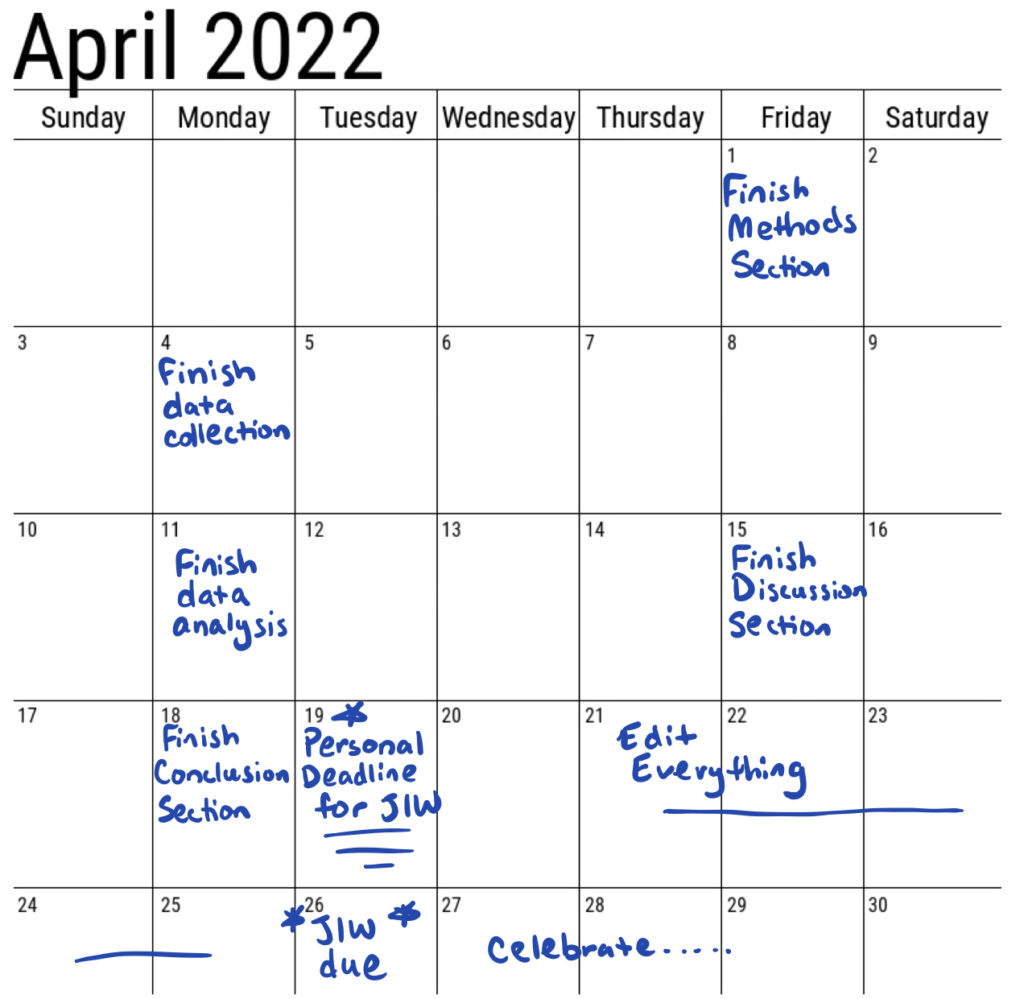As a B.S.E junior doing independent work for the first time, I am already anticipating the stressful cram at the end of the semester that comes with senior thesis and junior independent work deadlines. As busy Princeton students, we often don’t think that we have enough time in the week to work consistently on our independent work, and thus, a lot of it inevitably gets pushed off to the weeks (and days) before the deadline. But it doesn’t have to be this way. Putting together a comprehensive plan to organize and budget your time at the beginning of the semester can save so much hassle down the road. Therefore, I think it will be helpful to walk through how to create a plan for independent work over the course of the semester.

Find out what your final deadline is. Whether it’s your senior thesis or junior independent work, you should know what your deadline is. According to the Princeton Registrar, the final deadline for submitting senior theses is April 25th, and the final deadline for junior independent work is April 26th. However, it’s always a good idea to check with your department because some have earlier deadlines.
Set a personal deadline for one week before. So for example, if your thesis is due on April 25th, write in your calendar that it is due on April 18th. I like to do this with a lot of my important deadlines because it allows me to make sure that I have plenty of time to finish my work in case I am running behind. It also gives you several days to just focus on editing your work after you finish writing, because often when people are cramming to finish, they skip over the editing stage.
Set progress checkpoints. You may already be required to submit drafts to your advisor at certain points, but you can also determine your own goals for when you want to finish different steps. For instance, maybe you want to finish your data collection by Spring break. Put that in your calendar. Or, if you want to have your first draft of your thesis done by April 10th, then put that in your calendar. I would recommend making a list of five major deadlines you want to set for yourself and anywhere between five and ten minor deadlines that can help motivate you along the way. Minor deadlines can be something as simple as “write 250 words today” or “create a bar graph with trials 1 and 2.” It is important to make these smaller deadlines as specific as possible to allow them to be more manageable. For instance instead of writing “start first draft,” you can say “write opening two paragraphs detailing the objectives and purpose of the experiments.” This creates a measurable amount of work with a definite end point, which can help motivate you when you finish that day’s goal. Additionally, by spacing your work out into smaller checkpoints, it allows you to pay more attention to each step of the process. See an example below of what my April calendar section looks like with Junior Independent Work (JIW) checkpoints. If you want to set these deadlines for yourself, but aren’t sure where to start, you can always make an appointment with a McGraw Learning Consultant or you can ask your advisor for their advice.
Don’t get discouraged if you miss a deadline. It happens to all of us. Maybe you were extremely busy one week and you weren’t able to hit any of your personal deadlines. That’s okay. What’s important here is knowing how to regroup and edit your plan so that you can get back on track. First of all, don’t let the fact that you missed a few deadlines deter you from sticking to your plan. You may have to push back a few of your other deadlines or shift other things around, but you can still keep your schedule intact. If you are feeling unmotivated, try giving yourself smaller checkpoints. Maybe instead of having a goal to “finish the introduction section,” change this to “write four sentences in the introduction”. Then, once you achieve that, it can help motivate you to continue with your other goals.
It may seem like the deadlines for independent work are far away, but they are actually much closer than you might realize – only two and a half months away. Therefore, it is important to set aside time throughout your busy semester to dedicate towards working on your thesis or junior independent work. You’ll definitely thank yourself when the deadline rolls around.
–Bridget Denzer, Engineering Correspondent


